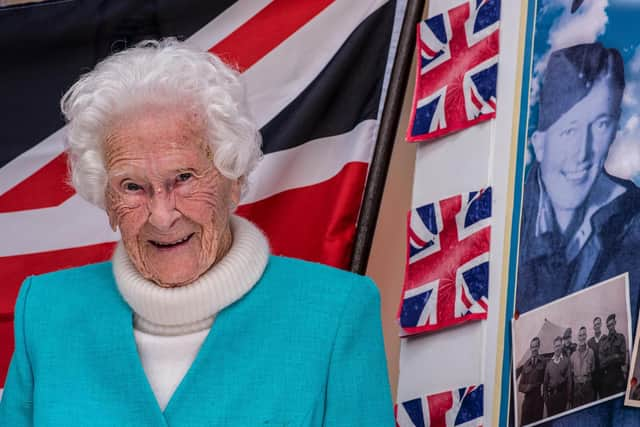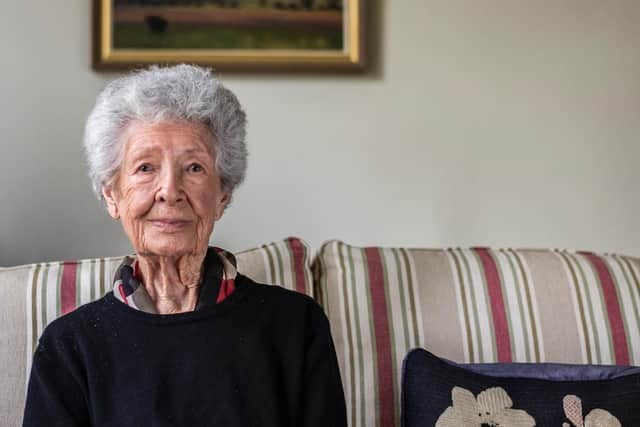Women of World War Two: Recollections from a codebreaker and WAAF veteran ahead of VJ Day
As Mary Todd made the familiar journey to the department store where she worked, she noticed the first sign that something was amiss.
“I was with my friend and we saw all these pipes leading from the river right across to the shop,” she recalls.
Advertisement
Hide AdAdvertisement
Hide AdMolly, as she’s better known, had been at Binns in her hometown of Sunderland since the age of 14. She was working as a tailor in its dressmaking department, though that was no longer to be after what happened that day in the Spring of 1941.


“When we got to the store, the fire engines were there and there was a big blaze. That was the end of Binns. It was a massive shop and it was bombed at both sides.”
The construction of a replacement building began four years after the Second World War came to an end, but in 1941 the devastation that had been wreaked by the blasts left a young Molly at 21, with no job to her name.
Her then boyfriend, 23-year-old butcher William Todd, had recently been conscripted and was serving with the Royal Air Force. “I had to do something else, either work in munitions or join the services,” Molly, now 101, recalls. “So I decided to join the RAF. I hoped I might be stationed near him.”
Advertisement
Hide AdAdvertisement
Hide AdIt wasn’t to be. Shortly after Molly joined the Women’s Auxiliary Air Force (WAAF) - and after the couple married by special licence during Billy’s first leave in 1941 - he was sent to serve overseas.


Leading aircraft woman Molly, meanwhile, became stationed at RAF Lyneham in Wiltshire, where she worked as a tailor, as well as becoming a qualified physical training instructor.
“I was in a marvellous station where they were training pilots, just young lads,” she says, speaking in the run up to the 75th anniversary of VJ Day this Saturday. Whilst it was VE Day in May 1945 that marked the end of the Second World War in Europe, many armed forces personnel were still embroiled in conflict in the Far East and it was only when Japan surrendered on August 15, that the war was finally over after six long years.
“I really had a good time in the air force, knowing the lads and feeling so proud,” says Molly, who lives in Harrogate. “They were so thrilled to be able to fly a plane. They were only just over 20. I was honoured to know them and alter their trousers and stitch their stripes on. They would tell me all their tales about the trips they had.”
Advertisement
Hide AdAdvertisement
Hide AdService during the war was quite different for 93-year-old Hilary Anderson, who was 17 when she joined the Women’s Royal Naval Service (known as the Wrens) just a few months before the conflict ended.
Hilary, originally from Newcastle, recalls having the choice between becoming a clerk or working on ‘Enigma’. She opted for the latter, becoming part of the team of ‘codebreakers’, who worked on intercepting and deciphering enemy communications.
After she joined in January of 1945, Hilary, who now lives in Harrogate with her sister, was posted to Eastcote, one of several outstations of the top-secret Bletchley Park.
“There were a lot of very well off Wrens from London,” she recalls. “I think we commoners in the North were brought in later when they were short of people. It was quite an elusive thing at first.
Advertisement
Hide AdAdvertisement
Hide Ad“When I first arrived, we had to go to bed during the day and then we were put onto nightwatch almost immediately. That was when we were learning and working out what we were doing, on a night shift.”
Her work was focused on operating a bombe, one of the tools used to help crack the coded messages that were being transmitted by Nazi Germany using the infamous Enigma encryption machine.
The bombe machine was designed to discover the daily key and configuration settings of the Enigmas, so that any intercepted messages could be deciphered. By the end of the war, more than 200 bombes were in operation.
“We were in front of these very huge machines,” Hilary recalls. “We had one each. It was actually very boring work really because a lot of the time, nothing happened. If the machine stopped, you then had to take a note of the reading.
Advertisement
Hide AdAdvertisement
Hide Ad“The machines were working until they got the right outcome but more often than not they didn’t and sometimes they didn’t even stop. When it did stop, we then read off this code from the machine, the numbers it was giving at that time. That information then went to Bletchley Park...We were never allowed to say anything about the work, we were sworn to secrecy.”
The codebreaking operations were hugely important to the success of the Allied forces. Once deciphered, the communications provided intelligence about opposition activity, helping Britain and its Allies to better plan military operations on land, at sea and in the air.
“It was absolutely vital,” says Hilary, who, after the war ended, worked with the Wrens supplying naval officers and recruits with equipment until leaving the service in 1947. “It’s said that the codebreaking work knocked two years off the war.”
That is certainly what a number of historians have estimated; and the codebreaking efforts were nothing short of indispensable given the already mass loss of life - a heart-wrenching consequence of the war that Molly knew all too well. Some of the young men she met at RAF Lyneham never returned from their missions - missing, killed, or taken prisoners.
Advertisement
Hide AdAdvertisement
Hide Ad“The difficult thing she had to contend with was people not coming back,” says Molly’s daughter Freda Burrell, with whom she now lives. “The guys that she knew and had got as friends, she saw them flying off to do various tasks and some of them didn’t come back and I think that was the worst part.”
“Yes, it was,” Molly chips in, her voice more despondent now. “They were just young lads.”
For many months, Molly was also concerned for the safety of her husband, hearing nothing of Billy’s whereabouts and assuming him missing. She later discovered a ship he had been travelling on, the Muncaster Castle, was torpedoed whilst off the coast of West Africa in 1942. It was six months before Molly heard that he was safe and she didn’t find out exactly what had happened until the war came to an end.
“The first air mail I got from him was when he was stationed in the Middle East but he couldn’t tell me what had held them up getting there. But apparently when the ship was torpedoed, some of them got on a raft and were adrift for four days...He got malaria and his skin was burnt off his legs and he finished up in hospital.
Advertisement
Hide AdAdvertisement
Hide Ad“He didn’t like to talk about what went on. When they told him to jump off the top of the ship, he said I’m not going to because I can’t swim. His pal said look pull your life jacket down and jump. He said he thought he was going to the end of the world, going down and down and gradually came up. There were four of them that managed to get on a raft for four days and a Greek trawler picked them up.”
During her time with the WAAF, Molly befriended a Scottish woman called Jenny, a friendship that would last throughout their adulthood. Serving with the army, Jenny’s boyfriend was missing for much of the war and it later emerged he was taken prisoner by Japanese troops at the beginning of the conflict. He came back, Molly says, “a nervous wreck”.
“With the victory over Japan, I thought a lot about my friend with her boyfriend having been in Japanese hands all those years,” she reflects.
Great-grandmother Molly was still in service on VJ Day; it wasn’t until September that year that she returned to civilian life. Billy had travelled back to the UK from the Middle East in the March and had then been posted over to Europe until 1946, freeing prisoners of war from camps on the continent.
Advertisement
Hide AdAdvertisement
Hide Ad“He was overcome by doing that,” Molly recalls. “They’d hug them to death because some of those people had been taken prisoner since the beginning of the war. He was based in Bruges and said some of them had lost an awful lot of weight.”
Due to his time in Europe, Billy did not meet the couple’s first daughter, Freda, until she was three months old. They went on to have two other children after the war was over, returning to Sunderland where they ran butcher’s shops.
Molly has now spent nearly thirty years without Billy, after he died aged 72. When she celebrated her centenary birthday last year, she did so with a 1940s-style party, donning a WAAF uniform once again, as her friends and family dressed in clothes from the wartime era. “I had a good time in the RAF,” she reflects now. “I was excited and didn’t have any hardship really. I was very lucky.”
The vJ Day anniversary will see people across the nation remember and pay tribute to those who served in the Second World War. At 11am, there will be a two minute silence, led by The Prince of Wales at the National Memorial Arboretum.
Advertisement
Hide AdAdvertisement
Hide AdThe Duke of Edinburgh will appear alongside other veterans in a photo montage series to be broadcast on large screens across the country. Armed Forces musicians will lead the nation in a Service of Remembrance, hosted by The Royal British Legion, a ceremony which will also include a Battle of Britain Memorial Flight flypast. And VJ Day 75: The Nation’s Tribute will be broadcast on BBC One, featuring an address from The Duke of Cambridge, paying tribute to veterans and the wartime generation.
For more stories from the YP Magazine and The Yorkshire Post features team, visit our Facebook page.
Editor’s note: first and foremost - and rarely have I written down these words with more sincerity - I hope this finds you well.
Almost certainly you are here because you value the quality and the integrity of the journalism produced by The Yorkshire Post’s journalists - almost all of which live alongside you in Yorkshire, spending the wages they earn with Yorkshire businesses - who last year took this title to the industry watchdog’s Most Trusted Newspaper in Britain accolade.
Advertisement
Hide AdAdvertisement
Hide AdAnd that is why I must make an urgent request of you: as advertising revenue declines, your support becomes evermore crucial to the maintenance of the journalistic standards expected of The Yorkshire Post. If you can, safely, please buy a paper or take up a subscription. We want to continue to make you proud of Yorkshire’s National Newspaper but we are going to need your help.
Postal subscription copies can be ordered by calling 0330 4030066 or by emailing [email protected]. Vouchers, to be exchanged at retail sales outlets - our newsagents need you, too - can be subscribed to by contacting subscriptions on 0330 1235950 or by visiting www.localsubsplus.co.uk where you should select The Yorkshire Post from the list of titles available.
If you want to help right now, download our tablet app from the App / Play Stores. Every contribution you make helps to provide this county with the best regional journalism in the country.
Sincerely. Thank you.
James Mitchinson